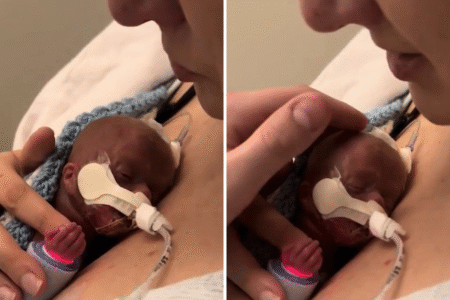A woman who went into hospital for a knee surgery has had her world turned upside down after being given a terminal brain cancer diagnosis.
For many years, Lori Pierce, 61, has struggled to walk and lived in pain because of her bad knee. But with a knee replacement surgery scheduled for July 9, she was excited to finally move on with her life and regain her mobility.
Pierce’s daughter, Valerie Fiordaliso, 42, told Newsweek that her mom was “ready and excited for the road ahead.” Of course, Pierce had some nerves about going under the knife, but they were vastly outweighed by the prospect of being able to walk and stand pain-free.
However, in the weeks following Pierce’s knee surgery, her family began to notice some troubling signs. Fiordaliso, who resides in Philadelphia, Pennsylvania, took her mom to a follow-up appointment and noticed that she seemed “really out of it.” Initially, she presumed it was a side effect of her mom’s pain medication and the fatigue of recovery.
“I remember driving her home and giving her a pep talk, telling her she’ll get through this like a champ. Around mid-August, my aunt noticed a few other things, like my mom fell three times, she was very anxious and had this sense of urgency, and she would misspell things in her texts,” Fiordaliso said.
Pierce went to the emergency room after falling but an MRI scan wasn’t conducted at the time. It wasn’t until later in August that Pierce went to see her general practitioner and alerted them to the cognitive symptoms. Initially, the doctor thought she might be having a stroke, so she immediately referred Pierce to the hospital for tests.
Pierce underwent a CT scan and brain MRI, leading to a devastating discovery. Pierce was diagnosed with a stage 4 brain tumor, known as glioblastoma.
Fiordaliso said: “My mom was scared and when I saw her, we just hugged each other tightly and cried. From there on out I documented a lot of this journey through video and pictures to remember her.
“Looking back at her behavior and things that seemed a bit odd, we noticed things that were happening at work around April, a situation around her birthday in June, and then the symptoms in August which were extremely visible and worrisome.”
The family remained hopeful, and Pierce quickly went into surgery after learning about the brain tumor. She was planning to do six weeks of radiation in addition to chemotherapy, but an MRI scan taken a month after surgery proved disastrous.
The scan showed that the tumor had grown back and was around a centimeter bigger than its previous size.
“At this point, my siblings and I had a very lengthy call with my mom’s neuro-oncologist. We found out that the tumor will never shrink, she will never be able to walk again, and her cognitive behavior will continue to decline,” Fiordaliso said.
The options were all presented to Pierce, and she ultimately decided that she doesn’t want any further treatment, opting for palliative care instead. It was a heartbreaking decision for Fiordaliso to process, but she doesn’t want to see her mom endure any more pain.
Pierce hasn’t been able to walk since the brain surgery, and Fiordaliso tells Newsweek that her cognitive functions have declined dramatically. It’s sometimes hard for Fiordaliso to fathom how much her mom’s life has deteriorated in a matter of weeks.
“It’s devastating how fast this tumor took over her life. She is very depressed, sleeps a lot and mourns her old life,” Fiordaliso said.
During this short space of time, Fiordaliso is trying to process her emotions while grieving the loss of her mom’s previous life. But she’s also having to juggle the pragmatics of being a power of attorney and finding sufficient healthcare for her mom.
It’s been far from easy, as Pierce was rejected by numerous nursing facilities due to the cost of her care. Fiordaliso has had to battle to be heard and ensure her mom is being looked after in the right care facility.
Documenting the horrifying journey on social media has been helpful for Fiordaliso, (@valeriemarie17). She has been sharing health updates, discussing her anticipatory grief, and the importance of advocacy. The power of social media has also enabled Fiordaliso to connect with other families who know the pain that a glioblastoma diagnosis can cause, and they’ve supported each other throughout.
“There is no easy way to prepare for something like this, you are thrown into one of the most traumatic experiences of your life. The brain is the executive center, and once something disrupts that, there may be differences in your loved one’s personality,” Fiordaliso said.
She continued: “If there’s one thing I’d want my mom to know, it’s how deeply loved she is. Through the heartbreak, chaos, and the pain, she’s been surrounded by so much love. I want her to know that her life and her grace have touched people in ways she’ll never fully realize.”
Is there a health issue that’s worrying you? Let us know via [email protected]. We can ask experts for advice, and your story could be featured on Newsweek.
Read the full article here

















